#taxonomy-is-racism
Text

I got this ask on main but thought I'd pick it up here, my comics history/fashion ramble blog. I'd been wondering this exact same thing recently, and Google initially wasn't much help—Rocketeer replica jackets describe themselves only as "Rocketeer jackets" and the one Lobster Johnson cosplay thread just suggested ordering one of those.

The most curious part is the double seam and horizonal row of buttons that mark out the entire front as possibly being an unbuttonable "bib", like a plastron front. (Please don't ask how late in the game I worked out that "plastron" is the right word for that.)
The closest genuine Golden Age example of a plastron jacket I found was the military tunic style uniform of Blackhawk, created in 1941.

(Pics from the '52 movie serial (right) really show how awkward it is to combine open lapels + plastron. On a double breasted coat, that chest panel IS the bottom lapel, folded shut.)
Here's the thing: This outfit mirrors that of the Nazi ace pilot he fights in the origin issue, von Tepp (middle). And compare further to the far right: real life WWI flying ace Manfred von Richthofen, AKA the Red Baron, in imperial German Uhlan (lance cavalry) uniform.
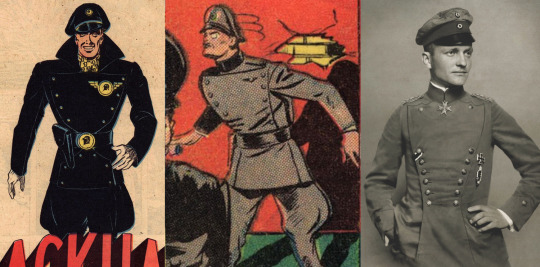
"The Germans had designed such great costumes, we decided to use them ourselves," co-creator Cuidera is quoted as saying in Steranko's History of Comics, which (more dubiously, in my opinion) compares the look to the Gestapo or SS. Breeches or jodhpurs weren't strictly a Nazi thing at the time, but they do add to the overall effect.
Compare two other military tunic themed costumes from 1940, on Captain Marvel and Bucky Barnes. These are asymmetrically buttoned, and switch to a more classic circus strongman look below the waist.

But somewhere around 1975, with the Invaders book, Bucky gets a buttoned bib! There's something infectious about it—the symmetry, maybe. (Even re: the characters we started with; Mignola didn't draw Lobster Johnson with buttons down the right side, but every artist after does. And Spider-Noir wore a sweater under his coat until Shattered Dimensions introduced the double-breasted vest.)
If it didn't reach his belt, Barnes' button-on front + shirt collar combo would resemble a bib-front western shirt, like the one that became the Rawhide Kid's signature look in '56. (Or Texas Twister's in '76.)
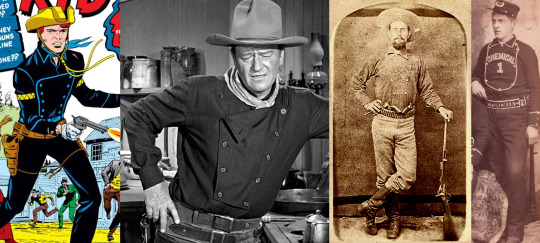
This shirt entered the old-West-obsessed public imagination in the 1940s/50s largely because John Wayne wore it in several cowboy movies. In reality it was rare among cowboys, more common with firefighters and civil war era militia.
Military tunics, Western shirts, alright, but does anything match the style and material and era, or are these jackets a total anachronism? I tried looking into 1930s leather flight jackets and was surprised when the closest-looking results were marked as Luftwaffe.
It took me a bit to work out why: USAF and RAF issued standard flight jackets with a center closure. The Luftwaffe instead let their pilots buy non-standardized ones. The 'weird' double-breasted black German flight jackets were in fact fairly normal (but repurposed) motorcycle racing jackets.
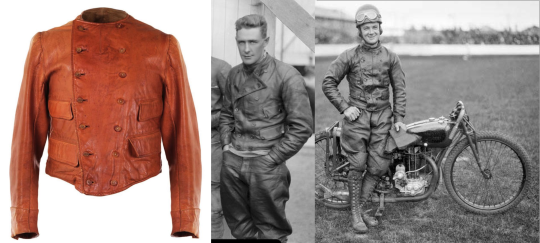
Far left is an English biker's jacket that dates back to the 1920s. Even without the bib, this may be as close as you'll get to an authentic Rocketeer. The jodhpurs were pretty common to complete the look. (What was an early motorcycle anyways, if not a weird metal horse?) The first biker jacket with the now iconic off-center diagonal zip was designed in America in 1928 and yet as far as I can tell, not a single actual pre-war pulp hero wore one.
The greatest weakness of this post is that I haven't been able to find any of these artists' notes on how, exactly, they arrived at similar versions of this iconic Pulp Front Panel Jacket. I'm sure I've missed some things. But as far as I can tell, this jacket is an odd bit of convergent stylistic evolution from the above influences that's picked up enough momentum to now be self-perpetuating.
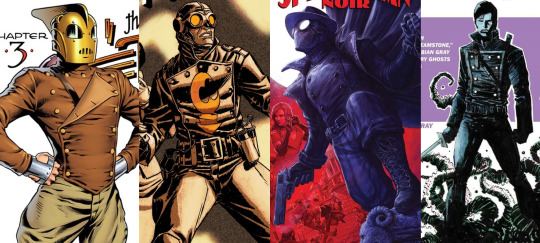
The problem with pulp heroes is that for the most part, they just wore clothes. The appeal of this jacket is actually very similar to what the 1940s thought the appeal of the bib-front shirt in westerns was: It's alien enough to feel "old". It looks like something invented before zippers or synthetic fabrics. It looks formal and militant but also renegade, rebellious. It also looks a little mad-sciencey*. It's a costume, but you can nearly fool yourself into thinking the past was weird enough that you could find something this cool on the rack.
If I wanted to end on some grand point, I could try to argue that there's a thematic throughline between fascist fashion, John Wayne movies, and throwback pulp. A manufactured aesthetic valorizing the violence of a fictional golden age... but I think the noir stylings of the post-Rocketeer comics in this lineup mean that, at least on some level, they know the "good guys" didn't dress like this.
*If I had another couple weeks of time to burn, I'd try to trace the visual history of the Howie coat in popular culture and investigate its possible connections to this. Alas, I do actually have a life.
#thank you for reading. also don't read golden age blackhawks the racism is awful even by era standards.#comics history#costume taxonomy#<- forgot I had that tag.#not to be like ''in MY favorite comics...'' again but may I point out that Hellboy and Robo and Tom Strong just wear... clothes#like. yknow. A pulp series that had confidence in itself rather than trying to cosplay as eras it thinks were cooler might do-#[I am yanked offstage before I can restart that rant]#the rocketeer
119 notes
·
View notes
Text
D&D's Obsession With Taxonomy
Like virtually everybody else in the TTRPG space I downloaded One D&D's playtest document to see what the fuss was.
One of the eyebrow-raising bits in that document is the boxed text titled "Children Of Different Humanoid Kinds":
"For example, folk who have a human parent and an orc or an elf parent are particularly common. Many other combinations
are possible ... Finally, determine the average of the two options’ Life Span traits to figure out how long your character might live. For example, a child of a halfling and a gnome has an average life span of 288 years."
Many people have problems with this passage. I can see why. But when I read it I laughed.
Of course D&D would handle this thing this way.
"Determine the average of the two options' Life Span traits to figure out how long your character might live"; the ludicrous math precision of "288 years"?
These bits are quintessential D&D.
+
"D&D is racist!" discourse returns again and again, like a pair of annoying missionaries.
(I've used this metaphor before. I'm pleased with it. I will repeat it as often as people repeat "D&D is racist!" discourse online.)
But a conversation that Flo began on Discord about the thoul has given me a way to talk about "D&D is racist!" in a way that doesn't bore me.
+
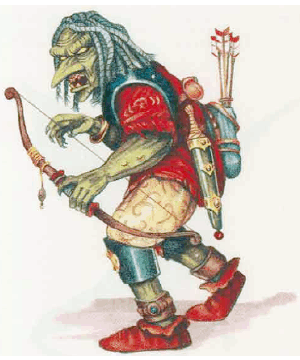
What is a thoul?
"Thouls are magical crosses between ghouls, hobgoblins, and trolls. In spite of their ghoulish blood, they are living creatures, not undead."
Gus points out that "thoul" is likely a typo -- "transcription error (first use of thouls replaces 'toads' as entry above 'ghouls' on table transferred from Monsters and a treasure to ready ref sheets)"
(Here's a fun link about the thoul's possible origins.)
The Discord conversation descends into laughter.
Flo: "I think D&D does not need as many humanoids as it has."
+
Here's my thought:
D&D is racist
is really:
D&D is obsessed with taxonomy
which is really:
Nerds are obsessed with taxonomy
+
People arguing over the differences between a wyvern and a dragon; or
People insisting that Tolkien made a categorical distinction between orcs and goblins (no, he did not, go read "Lord of the Rings" again); or
People arguing about whether "Star Wars" is science fiction or science fantasy, and then arguing about the boundaries of science fantasy; or
What Are The Differences Between High Fantasy And Low Fantasy
Etc, etc, etc.
All of the above cliche-nerd-arguments are about more-or-less arbitrary distinctions. The utility of these categories tend to be vastly overblown.
+
Categories are useful.
There is a distinction between performance art and the performing arts because they arise from separate traditions; ditto the many strains of music genre.
But these are useful precisely because they communicate a history of people exercising agency -- creators choosing to define themselves in relation to history / tradition / peers, letting those things define their work.
Categories are subjective actions, not objective facts.
+
What the nerd approach to taxonomy ("a dragon is NOT a wyvern!!!") does well is make a field of knowledge / phenomena predictable, quantifiable: "This is the way the world is."
Therefore fully understandable: "I know the world."
Therefore possible to act on: "I know what do with the world."
You can solve it, apply best practices to it, optimise it, own it, possess it.
Definitive taxonomies like "goblin / hobgoblin / bugbear" is better for you because then you can shorthand these creatures into three separate and discrete scripts.
Instead of: "goblin people come in a lot of different sizes -- some are big, some are puny, some are kind, some are not -- it all depends. You got to just pay attention to each one."
Which makes things messier, more unpredictable, meaning you have to pay attention, exercise discretion / empathy more, possibly accommodate new perspectives.
"I know the bugbear better than it knows itself, I got this."
vs
"Okay so how do I get to know Ms Goblin better?"
+
When I posted these thoughts to Discord, Marcia observed:
"The connection between taxonomy and power, that nerds find it empowering to possess an abstract knowledge which they impose onto things, seems related to what has been identified as phallic desire ..."
(Meaning that this blogpost should really be titled D&D's Obsession With Phallic Desire , for maximum clickbait -- but this is Marcia's thought, don't wanna steal her thunder!)
+
One advantage to quantifiable, objective, abstracted taxonomies in games:
It helps with logistics in play.
The mental load for players in TTRPGs is already so high -- at least it is for me, weak-brained nerd as I am; I need some shorthand just to help my imagination along.
BUT!
If helping with mental load was the purpose for D&D obsessive taxonomy -- it'd be way simpler than it now is???
Tracking all the split hairs between D&D FINAL EDITION's ten thousand different Conditions is empathically not making play easier.
+
Back to the thoul. Gus again:
"Thouls - my take is they are interesting as a set of mechanics - but incoherent as a creature. The need to justify their abilities via existing monsters makes then nonsensical- better just to have them be some sort of manifestation of goblin magic or science ... That D&D chose instead to taxonomize them says something about D&D."
+
The thoul's "part ghoul, part troll, part hobgoblin" thing is much like the "half-dradkin half-celestial ranger 5 / paladin 7" NPCs you see in mainstream RPG adventure-path-type books.
Which is much like: "determine the average of the two options’ Life Span traits" and "288 years".
Aesthetically and ethically incoherent; mechanically convoluted -- but absolutely sensical if your purpose is to safeguard access to a highly taxonomised "objective" worldview.
Nerds don't mind figuring out complicated fractions of abstract objective absolutes. Because this means you can still ultimately sort reality into absolutes.
You can still grasp (in all senses of the word) the world.
That thought is safer / more advantageous than: "yeah you just gotta deal with things being a messy soup, people are not lines of code, you gotta pay attention to everything in its own context."
+
This is turning out to be a post assisted by Discord chorus.
Re: the drive for taxonomy-based worldbuilding -- and concurrent to thoughts about how Non-Diegetic Objective Maps Are Naff Actually -- Ava:
"the whole "fantasy worldbuilding, with its concrete ontologies and god's eye histories and maps replicates + reifies colonial epistemology" was the whole deal of my thesis."
(Ava you need to write a blogpost about this thesis!)
Re: literal scientific taxonomy -- Dan:
"D&D's obsession with taxonomy is weirder to me than normal taxonomic obsessions because of how hard it tries to ape natural sciences and then leaves out every possible interesting thing actually studying ecology could lead to."
Which sparked a discussion about the politics of binomial nomenclature, how there's a great deal of re-classification going on in scientific fields.
Syd:
"there’s actually been a lot of big reshuffles that have come out of the fact that people realized certain classifications had been from phenotypical similarities (physical characteristics) but not genotípicas relationships. And even when it isn’t political in the sense of changing names that we’re given as honorifics there’s actually a huge pushback just from people who think it shouldn’t change bc that’s historically how it was, even if it doesn’t fit our current models of what taxonomy is actually useful for in ecology and biology."
Something something, categories are subjective actions, not objective facts, something something.
Flo, with the final word:
"It's the same thing that gives the Internet sandwich discourse.
'Is x a sandwich?' A sandwich is not an objective fact. A sandwich is an idea. A sandwich is a category we choose to make."
+
( Image source: https://dmdavid.com/tag/the-strange-mystery-of-the-dd-monster-called-a-thoul/ )
130 notes
·
View notes
Text
i've gotten asks a few times on like 'how to do ''fantasy races'' without. like. just making race science true in the world'. and i think there's three approaches. the first is harkening back to tolkein and making it clear through framing device or format/tonal cues that you are writing in a mythic register--that you are writing about a world where the basic premises of positivism and empiricism simply aren't true. a world where 'biology' is like, not necessarily a salient premise--where there are things that just cannot be understood. (that's not to say that tolkein's orcs werent v. racialised in v. nasty ways--but it wasn't race science in the way a lot of more modern fantasy is.)
the second way i think is to go and actually understand the history of 'race' as a concept. 'race' has not always existed--it was an ideological invention birthed from / alongisde the enlightmenent and imposed onto populations through military force. in real life, it's less helpful to conceive of 'race' as an attribute someone has and and more as a relationship they have to society. so if you want to actually include scientific racism in your story as an element of your worldbuilding and not something decalred epistemologically true you should be thinking about why these people have been racialized and under what hegemonic paradigm--who, in-universe, invented & enforces the racial classification system that distinguishes between 'human' and 'orc' as taxonomic characters?
the third and final way is to simply think of the traits you understand as belonging to ''fantasy races'' (say, pointy ears and exceptional nimbleness and hundred-year lifespans for elves) as instead just being... more variations in the way people can be. like, in the real world, we do not consider 'tall people' or 'blonde people' or 'myopic people' a different species. in a world where sometimes people have wings or pointed ears or green skin, why should that be different? you've just introduced new types of variation within the population of people--you've just expanded the meaning of human. and of course, right, you can still roughly group these features, or note that some of them are more frequent in some ethnic groups--in much the same way as saying 'on average, people in sweden are taller, paler, and more likely to be blonde and blue-eyed', you can say 'people in these forests tend to be shorter and live longer and have pointed ears'--without having a hard taxonomy that classifies all these attributes as metaphysically different Types Of Person
obviously these are all very different approaches--and there are probably other ways to handle this too! i just get this question a lot whenever i do Orc Discourse and finally felt like getting these thoughts out. there are so so so many places we can take fantasy--let's move the horizon beyond 'magical race science' and imagine genuinely new worlds
4K notes
·
View notes
Text
How Scientific Taxonomy Constructed the Myth of Race / Cómo la taxonomía científica construyó el mito de la raza
#Antropología#Taxonomía#Raza#Ciencia Racistas#Crítica#Humanidades#Homo Sapiens#Homínidos#Primates#Animales#Las Razas No son Biológicas sino Culturales#Antiracismo#Anthropology#Taxonomy#Race#Humankind#Races Don't Exist#Racism Science
0 notes
Text
A taxonomy of corporate bullshit
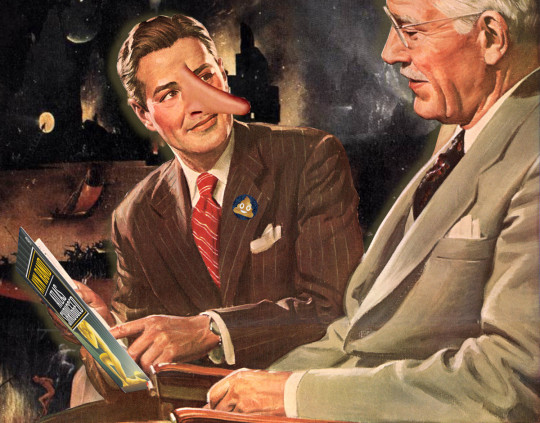
Next Tuesday (Oct 31) at 10hPT, the Internet Archive is livestreaming my presentation on my recent book, The Internet Con.

There are six lies that corporations have told since time immemorial, and Nick Hanauer, Joan Walsh and Donald Cohen's new book Corporate Bullsht: Exposing the Lies and Half-Truths That Protect Profit, Power, and Wealth in America* provides an essential taxonomy of this dirty six:
https://thenewpress.com/books/corporate-bullsht
In his review for The American Prospect, David Dayen summarizes how these six lies "offer a civic-minded, reasonable-sounding justification for positions that in fact are motivated entirely by self-interest":
https://prospect.org/culture/books/2023-10-27-lies-my-corporation-told-me-hanauer-walsh-cohen-review/
I. Pure denial
As far back as the slave trade, corporate apologists and mouthpieces have led by asserting that true things are false, and vice-versa. In 1837, John Calhoun asserted that "Never before has the black race of Central Africa, from the dawn of history to the present day, attained a condition so civilized and so improved, not only physically, but morally and intellectually." George Fitzhugh called enslaved Africans in America "the freest people in the world."
This tactic never went away. Children sent to work in factories are "perfectly happy." Polluted water is "purer than the water that came from the river before we used it." Poor families "don't really exist." Pesticides don't lead to "illness or death." Climate change is "beneficial." Lead "helps guard your health."
II. Markets can solve problems, governments can't
Alan Greenspan made a career out of blithely asserting that markets self-correct. It was only after the world economy imploded in 2008 that he admitted that his doctrine had a "flaw":
https://www.pbs.org/newshour/show/greenspan-admits-flaw-to-congress-predicts-more-economic-problems
No matter how serious a problem is, the market will fix it. In 1973, the US Chamber of Commerce railed against safety regulations, because "safety is good business," and could be left to the market. If unsafe products persist in the market, it's because consumers choose to trade safety off "for a lower price tag" (Chamber spox Laurence Kraus). Racism can't be corrected with anti-discrimination laws. It's only when "the market" realizes that racism is bad for business that it will finally be abolished.
III. Consumers and workers are to blame
In 1946, the National Coal Association blamed rampant deaths and maimings in the country's coal-mines on "carelessness on the part of men." In 2003, the National Restaurant Association sang the same tune, condemning nutritional labels because "there are not good or bad foods. There are good and bad diets." Reagan's interior secretary Donald Hodel counseled personal responsibility to address a thinning ozone layer: "people who don’t stand out in the sun—it doesn’t affect them."
IV. Government cures are always worse than the disease
Lee Iacocca called 1970's Clean Air Act "a threat to the entire American economy and to every person in America." Every labor and consumer protection before and since has been damned as a plague on American jobs and prosperity. The incentive to work can't survive Social Security, welfare or unemployment insurance. Minimum wages kill jobs, etc etc.
V. Helping people only hurts them
Medicare will "destroy private initiative for our aged to protect themselves with insurance" (Republican Senator Milward Simpson, 1965). Covid relief is unfair to people that are currently in the workforce" (Republican Governor Brian Kemp, 2021). Welfare produces "learned helplessness."
VI. Everyone who disagrees with me is a socialist
Grover Cleveland's 2% on top incomes is "communistic warfare against rights of property" (NY Tribune, 1895). "Socialized medicine" will leave "our children and our children’s children [asking] what it once was like in America when men were free" (Reagan, 1961).
Everything is "socialism": anti-child labor laws, Social Security, minimum wages, family and medical leave. Even fascism is socialism! In 1938, the National Association of Manufacturers called labor rights "communism, bolshevism, fascism, and Nazism."
As Dayen says, it's refreshing to see how the right hasn't had an original idea in 150 years, and simply relies on repeating the same nonsense with minor updates. Right wing ideological innovation consists of finding new ways to say, "actually, your boss is right."
The left's great curse is object permanence: the ability to remember things, like the fact that it used to be possible for a worker to support a family of five on a single income, or that the economy once experienced decades of growth with a 90%+ top rate of income tax (other things the left manages to remember: the "intelligence community" are sociopathic monsters, not Trump-slaying heroes).
When the business lobby rails against long-overdue antitrust action against Amazon and Google, object permanence puts it all in perspective. The talking points about this being job-destroying socialism are the same warmed-over nonsense used to defend rail-barons and Rockefeller. "If you don't like it, shop elsewhere," has been the corporate apologist's line since slavery times.
As Dayen says, Corporate Bullshit is a "reference book for conservative debating points, in an attempt to rob them of their rhetorical power." It will be out on Halloween:
https://bookshop.org/a/54985/9781620977514

If you'd like an essay-formatted version of this post to read or share, here's a link to it on pluralistic.net, my surveillance-free, ad-free, tracker-free blog:
https://pluralistic.net/2023/10/27/six-sells/#youre-holding-it-wrong
#pluralistic#corporate bullshit#lies#books#reviews#taxonomies#labor#denialism#consumerism#Nick Hanauer#Joan Walsh#Donald Cohen#history#object permanence#taking the right seriously
834 notes
·
View notes
Text
This is a clearer version of the previous post:
I don't know who in the community needs to hear this, but don't refer to humans as apes! (No, "monkeys" is not ok either!)
"Humans are taxonomically great apes, so technically--"
This post is not about human taxonomy
"I don't mean it in a racist way!"
Ok but I need you to understand that it still very much is though. Don't say that shit. It happens in this community way too often.
So why is this being brought up? Because it is very, frustratingly common for those who identify as nonhuman to refer to humans as "apes" or "monkeys" in a derogatory manner. For some people, they consider themselves distanced enough from humanity that this suddenly becomes an ok thing to say, and it is not. Even in a non-derogatory sense, that does not erase that it's still, well, quite racist.
"What should I use instead then?"
Human. That's all. You don't need special vocabulary to replace "apes" and "monkeys" with when talking about humans. Just say human.
And "that's racist" is a scary phrase for a lot of people and tends to send them into defense mode, rejecting the possibility of ever saying anything racially insensitive. "It's not racist because I'm not trying to be racist" is not how racism works. You have to catch yourself. Because while we hate to say it, the alterhuman community can be quite racist (and appropriative, but that's a different discussion), and the reason people of color tend to be so uncomfortable in the community and avoid interaction is because whenever we speak up about these issues there is a sudden pushback.
If you are lucky enough to not have seen it then that is fantastic, but it can mean one of two things:
You were lucky
You just weren't able to recognize them
Neither of these things immediately makes you a bad person, but what you need to do in any case is listen and understand that this is a very real thing that many have to deal with regularly.
277 notes
·
View notes
Text
the Bantu dialect. the Bantu dialect. the Bantu dialect, singular. the singular Bantu dialect* invariably spoken by all of the Africans enslaved and brought to Louisiana.
I can't adequately explain, briefly, just how fucking bonkers of a phrase that is. just how completely outlandish. the Bantu dialect...
Bantu is a family of languages. actually it's like, a family of language groups. it is a huge, high-level division of language clades. the sub-divisions of the Bantu family can be further subdivided into nodes that are subdivided into languages (and then those languages are sub-divided into dialects).
even just following wikipedia's version of the taxonomy (all of this is constantly subject to argument and revision): the Mbam languages are a group of Bantu languages. the "Mbam" umbrella divides into the Sanaga, West Mbam, and Yambasa language groups. the Sanaga node can be further divided into the Tuki, Leti, and Mbwasa languages. dialects of Tuki include Kombe, Cenga, Tsinga, Bundum, Njo, Ngoro, and Mbere. one randomly chosen node of one node of one node of the Bantu language group has seven dialects (eight, if you count Mbwasa, which some linguists do).
linguists who study any subgroup of African languages frequently complain about ignorance surrounding them, the prototypical example being people who think that every African language is perforce a Bantu one. this man is not even knowledgeable enough to be at that level of ignorance. he published this. he wrote an easily verifiable claim about the accepted etymology of a word and didn't even bother checking, and then he published that in a book.
about 5% of the world's population speaks one of these 400-600ish languages. in terms of number of recognised, living languages, this statement is sort of like if I called Indo-European a "dialect." thus basically all of Europe except for Finland, everyone in the north of India, and the entire Iranian plateau speak "the Indo-European dialect." completely insane. off-the-wall bonkers amounts of racism at work here.
*If Bantu is a "dialect," by the way, one wonders which broader language it is a dialect of? Really, though, we needn't ask—here "dialect" simply means "something spoken by African or Indigenous people and therefore not worthy of the exalted word 'language'"
#by the way the density and diversity of languages here is not special to Africa#Europe was like this too until linguistic diversity was systematically quashed#gumbo research saga
76 notes
·
View notes
Text
"D&D isn't racist, it's just obsessed with taxonomy" falls apart immediately when you remember
1. Some of the shit the gygax's family have said and done.
Things like Gary calling the wounded knee massacre “an act of lawful good” or the current lawsuits around TSR and some very explicitly racist material one of his failsons is involved with.
2. Racism in academia exist, especially in the very outdated models anthro/socio models they're parading around with calipers.
Say like, who gets to be considered a culture in dnd and which folks don’t. Don’t even get me started on how they handle religion...
3. How they have treated irl workers.
Gosh, It’s not like there isn’t a whole class of BIPoC game designers that have their face, name, likenesses, and work used as marketing only to be treat like crap, have their work altered last minute without consent or consulting that alters the very nature of the work and reinserts the shit they were hired to avoid, ect putting these designers in an unfortunate position to be scapegoats for their community.
4. intent =/= harm done
Lived experience of racist aggression on both a micro and macro level tells me as much and it’s not like I’m the only one out there repeatedly going “this sucks”.
sorry my working conditions as a designer and wanting to be treated like a human being annoys you though.
262 notes
·
View notes
Note
Sam! I know this is very late, but I was scrolling back through your Shivadh-tag and had a thought about Simon's rival chef. My two cents is for a North African chef. I am missing people of color in these books. A-S is a Mediterranean country, so there's got to be some immigrant presence. And it sets you up to have some kind of community of color already established when you write your soccer (football, whatever) book, since those teams seem to have a lot of young men of color on them, from an outsider's untrained eye. (And I know you aren't getting into heavy real-world stuff, but A-S is a friendly coastal country, and I just keep thinking about refugees and immigration these days.)
I was just thinking about this the other day and wondering! I'm pretty committed to the chef being Shivadh by birth but that's nationality, not race, and there's no reason she couldn't be the child of immigrants, or of African descent, and possibly working in the immigrant/refugee community within Fons-Askaz. I've been trying to consciously include more racial diversity in the upcoming books, but that's still something I'm working out. I do have a couple of characters in mind, but nothing significant written for them yet.
I've been hesitant because I know that race and racism are viewed and act differently in Europe than they do in the US and often it's pretty regional. Without being immersed in the culture it's rough to pick up on, so I don't want to fuck up portraying that. But also these are "blue sky" novels where people aren't meant to be dealing with that kind of problem more than absolutely necessary -- viz Caleb not really coming up against any transphobia, Buck only mentioning biphobia in passing, etc -- so I think that's anxiety rather than realism talking.
Regardless, while I'll be doing my own research I'd also welcome trustworthy resources on race/diversity and racism as it appears in the Mediterranean, particularly southern France and northern Italy. If I can master the casual Italian attitude towards pastry taxonomy surely I can master this.
91 notes
·
View notes
Text
What is Scientific Racism? - Carl Linnaeus and Taxonomy
youtube
There's a major difference between indoctrination and education, indoctrination is basically popular opinion without evidence to support it and education is based on evidence and facts. Please understand that indoctrination can be used in education being taught by someone who holds these opinions to be facts.
Not to confuse you because education which is backed by the use of scientific methods or recorded laws provides evidence and facts in regards to it's origin. I do hope you understand this because it took me years to make sense out of this until my junior year in college. Yes, I'm slow but I did have some potentials to learn.
#black love#black positivity#black africans#black history#science#evolution#science side of tumblr#atheism#african atheism#Youtube
3 notes
·
View notes
Text
Hirschfeld wasn't a beacon of enlightment on racism but he was at worst as racist as your average middle class german jew at the time and often probably a bit better
He's certainly better in the book he wrote about racism towards the end of his life. I don't want to overstate it -- the source I'm pulling the below quote from is one largely critical of how Hirschfeld failed to challenge the racial/racist norms in his society -- but i doubt any of Hirschfeld's thinking on race was ever at all compatible with far right eugenics and they most certainly were not by the time he wrote that book
"While Hirschfeld wrote about a wide range of issues, including, as this book shows, suicide, war, and corporal punishment, he typically angled the focus of any of his discussions toward affirming homosexuality. This is also true for his book-length study Rassismus (Racism), which was written in the early 1930s, when Hirschfeld had already left Germany to escape Nazi persecution. [...] It was one of the first works to use the term racism in an English context. Hirschfeld’s motivations for writing Racism were clear. He argued that he had decided to examine “the racial theory which underlies the doctrine of race war” for the very reason that he himself “numbered among the many thousand who have fallen victim to the practical realization of this theory.” These words, noting Hirschfeld’s personal investment in the topic, firmly identify Racism as a response to Nazi ideology and its implementation. A number of scholars have argued that it was the practices and principles of German colonialism that paved the way for the rise of Nazism. Hirschfeld’s historicization of Nazism in contrast traces the roots of racist thinking in Germany to the ideas and scientific developments of the German Enlightenment. Providing an overview of racial thinking in German culture and science from Enlightenment discipline formations to Nazi ideology, he focuses in particular on how ideas about race have been constructed and transmitted in the country. Somewhat curiously perhaps, given his own experiences, he barely touches on antisemitism, figuring racism instead in terms of spurious theories about skin color. Explaining that he was taught in school that humanity is divided according to Friedrich Blumenbach’s color-coded taxonomy into five distinct “races”—black, white, yellow, red, and brown—Hirschfeld suggests that the teaching of this classification is partly how scientific speculation is vernacularized as a universal truth. Such truths in turn underpin Western assumptions about modernity, which conflate ideas about civilization (or its perceived lack) and skin color to make claims for the existence of racial hierarchies that inevitably privilege whites and that are more often than not—as in the case of German Nazism—used to further a politics of national expansion and supremacy.
Hirschfeld’s understanding of the construction and naturalization of racial categories led him to proclaim that “if it were practicable we should certainly do well to eradicate the use of the word ‘race’ as far as subdivisions of human species are concerned; or, if we do use it in this way, to put it in quote-marks to show that it is questionable."
From Sexual Rights in a World of Wrongs: Reframing the Emergence of Homosexual Rights Activism in Colonial Contexts in The Hirschfeld Archives by Heike Bauer
6 notes
·
View notes
Text

🪺 Sparrow Envy: Field Guide to Birds and Lesser Beasts by J. Drew Lanham
This slim poetry collection packs a punch as our author writes on the beauty and wonder of nature around him, along with his struggles dealing with racism and profiling.
It’s a wonderful collection and I highly recommend it. My favorite poems were “Octoroon Warbler”, a poem about the problematic history in taxonomy; and “Field Mark 1: Love for a Song”, which tells us about love 👇
“The surge, that overwhelming inexplicable thing in a swallow’s joyous flight or the dawning of new light that melds heart and head into sensual soul in that moment of truly seeing- that is love.”
#godzilla reads#sparrow envy#sparrow envy: field guide to birds and lesser beasts#j drew lanham#poetry#book review#booklr#reading#reads#nature poetry#bookworm#bookish#book blog#booklover#book blurb#quotes#bibliophile
22 notes
·
View notes
Text
Race, Ethnicity, and “Racism” in Greco-Roman Society – Thuletide
6 notes
·
View notes
Text
Genuinely need to emphasize how much nationhood as both entity and identity is a modern concept and that sovereignty exists only as far as you can get everyone else to pretend it exists along with you. There is no American national identity which is intrinsic to people, nor is there a Jewish, Israeli or Palestinian identity in the same sense - there is no Brazil beyond that which is seen and enforced by the rest of the world, and no Jewishness beyond the rest of the world seeing you as one.
That's the key to understanding racism and antisemitism and xenophobia; it's the key to the Hegelian master-slave dialectic upon which our understanding of class relations rests. The master needs the servant in order to be a master; and the servant depends on the master to serve. USAmerican imperial sovereignty is conditional to international acceptance of it; and the Third World is shaped by its systematic exclusion of the international order's affairs. So it is that the Jew is decided by who would have us destroyed, and the Palestinian is marked by who the occupation deems should die, and Womanhood exists as a tool to submit and press the power of the patriarchy rather than as a cohesive, consistent category, just as Race is first defined by the white slave trader and the philosopher beside him, itching to find what should make a man worthy of slavery.
To consider these things as categories in and of themselves is a mistake; to think of the world as operating as per dictionary definition is a woeful enterprise that begins in the halls of academia and ends so soon as one reads Wittgenstein in his later years, protesting wholesale the language we speak.
Should it be that we confess and fall to accepting that there is ontological difference between Israeli and Palestinian, Jew and Muslim, Man and Woman, White and Black, that these categories are made of firm fiber and divided by barbed wire, then we fail to refute the premise; we fail humanity whole when we admit to the segregation of these types, that there is firm and solid differences in their capacity and worth and intelligences, that because one is conferred privilege of the right passport they ought to be entitled to life and opportunity to which the other is denied. The individual intelligence of each is belonging to each, rather than to divide them among taxonomy which seeks to determine what rights one is endowed to. The national difference is little different than a new formulation of the racial difference; the arrangement of geopolitics little but a newfound form of segregatory practice.
4 notes
·
View notes
Note
When you get this, please respond with five things that make you happy! Then send it to the last ten people in your notifications (anonymously). You never know who might benefit from spreading positivity. ♡
You probably should have asked my main blog which I will not link here but as a worldbuilder, things that make me happy are:
Other people making smart worldbuilding, like creating causative loops ("vampires don't use canalization to traverse the city because there are alligators in it which are blessed by special underground temples dedicated to them which are here because vampires did use canalization for travel before and now need to be stopped" post)
When love wins against gods' will.
When there are ways for people to change their shape, but it is difficult and they must travel a lot to find their true shape (otherkin and trans people rise up!)
Evolution and lore regarding taxonomy of sentient species. If not taxonomy then just different stories of creation of said species.
When in a setting, racism, sexism, and other such pests exist only for time and actually smart people to eradicate them to dust.
As extra: Interracial couples and their kids; Disabled people being helped but not in a way of "erasing the disability" but giving them a way to overcome/turn it off for a time as long as the device or magic works; Dragons and other sentient huge beasts; Fluffy sentient species you would love to hug; Goblins; Kobolds; Elves; Dwarves; Werewolves; Unusual ways of magic, like coins with three sides, and not just Fireball by Mister Worldwide; Magic being an object of fascination even if it is weaved into the very fabric of reality.
6 notes
·
View notes
Note
Wandering Jew is also out.
https://www.hoytarboretum.org/racism-in-taxonomy-whats-in-a-name/#:~:text=Tradescantia%20zebrina%2C%20for%20example%2C%20is,the%20Nazi%20propaganda%20of%20WWII
Pretty sure that one's been out for a while too, the whole legend about him is probably enough to get it pulled.
Jewish man that mocked Christ on the cross and was cursed to wander the world till the end of time as a result.
As legends go, that one makes no sense, if for no other reason than it totally is out of character for Jesus to curse a person like that, demons and fig trees yes, but not people.
And I'm now seeing why I should have checked the link first.
There are also plant names with offensive origins that aren’t as obvious. Tradescantia zebrina, for example, is currently called “Wandering Jew.” This name is based on a fictional character who was used to support antisemitism from the 13th century through the Nazi propaganda of WWII. “Why would we continue using that?,” you may be asking. It’s possible that the covert nature of its history has allowed the name to stick around for so long. People may unintentionally justify the name through assuming it has Biblical or geographical origins, or just by not asking questions altogether. Better names for Tradescantia zebrina are Wandering Spiderwort, Variegated Spiderwort, and Wandering Dude!
__________________________
interesting.
Anyone but me remember this whole thing
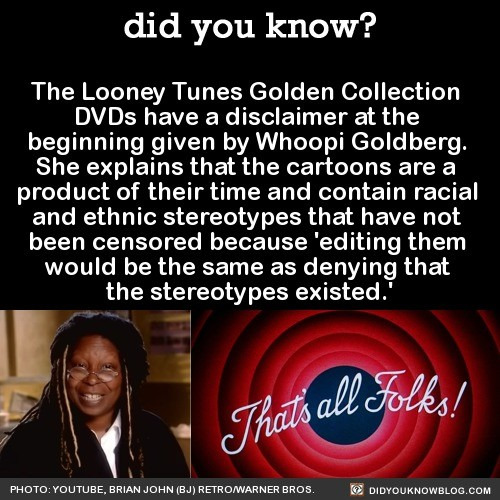
I miss this attitude.
'This is where we were at one point look at how much we've come since then'
deleting all of this stuff only serves to make it so it can come back later
15 notes
·
View notes